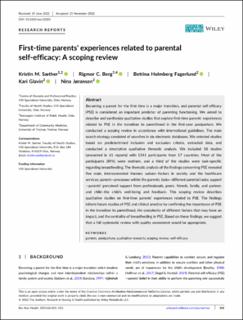| dc.contributor.author | Sæther, Kristin Marie | |
| dc.contributor.author | Berg, Rigmor | |
| dc.contributor.author | Holmberg Fagerlund, Bettina | |
| dc.contributor.author | Glavin, Kari | |
| dc.contributor.author | Jøranson, Nina | |
| dc.date.accessioned | 2023-01-13T09:37:35Z | |
| dc.date.available | 2023-01-13T09:37:35Z | |
| dc.date.created | 2023-01-09T09:52:41Z | |
| dc.date.issued | 2022 | |
| dc.identifier.citation | Research in Nursing and Health. 2022, 1-12 | en_US |
| dc.identifier.issn | 0160-6891 | |
| dc.identifier.uri | https://hdl.handle.net/11250/3043273 | |
| dc.description | This is an open access article under the terms of the Creative Commons Attribution‐NonCommercial‐NoDerivs License, which permits use and distribution in any medium, provided the original work is properly cited, the use is non‐commercial and no modifications or adaptations are made. | en_US |
| dc.description.abstract | Becoming a parent for the first time is a major transition, and parental self‐efficacy (PSE) is considered an important predictor of parenting functioning. We aimed to describe and synthesize qualitative studies that explore first‐time parents' experiences related to PSE in the transition to parenthood in the first‐year postpartum. We conducted a scoping review in accordance with international guidelines. The main search strategy consisted of searches in six electronic databases. We selected studies based on predetermined inclusion and exclusion criteria, extracted data, and conducted a descriptive qualitative thematic analysis. We included 58 studies (presented in 61 reports) with 1341 participants from 17 countries. Most of the participants (89%) were mothers, and a third of the studies were task‐specific regarding breastfeeding. The thematic analysis of the findings concerning PSE revealed five main, interconnected themes: culture—factors in society and the healthcare services; parents—processes within the parents; tasks—different parental tasks; support —parents' perceived support from professionals, peers, friends, family, and partner; and child—the child's well‐being and feedback. This scoping review describes qualitative studies on first‐time parents' experiences related to PSE. The findings inform future studies of PSE and clinical practice by confirming the importance of PSE in the transition to parenthood, the complexity of different factors that may have an impact, and the centrality of breastfeeding in PSE. Based on these findings, we suggest that a full systematic review with quality assessment would be appropriate. | en_US |
| dc.language.iso | eng | en_US |
| dc.publisher | Wiley | en_US |
| dc.rights | Attribution-NonCommercial-NoDerivatives 4.0 Internasjonal | * |
| dc.rights.uri | http://creativecommons.org/licenses/by-nc-nd/4.0/deed.no | * |
| dc.subject | self‐efficacy | en_US |
| dc.subject | scoping review | en_US |
| dc.subject | qualitative research | en_US |
| dc.subject | postpartum | en_US |
| dc.subject | parents | en_US |
| dc.title | First-time parents' experiences related to parental self-efficacy: A scoping review | en_US |
| dc.type | Peer reviewed | en_US |
| dc.type | Journal article | en_US |
| dc.description.version | publishedVersion | en_US |
| dc.rights.holder | © 2022 The Authors. Research in Nursing & Health published by Wiley Periodicals LLC | en_US |
| dc.source.journal | Research in Nursing and Health | en_US |
| dc.identifier.doi | 10.1002/nur.22285 | |
| dc.identifier.cristin | 2102984 | |
| cristin.ispublished | true | |
| cristin.fulltext | original | |
| cristin.qualitycode | 2 | |

